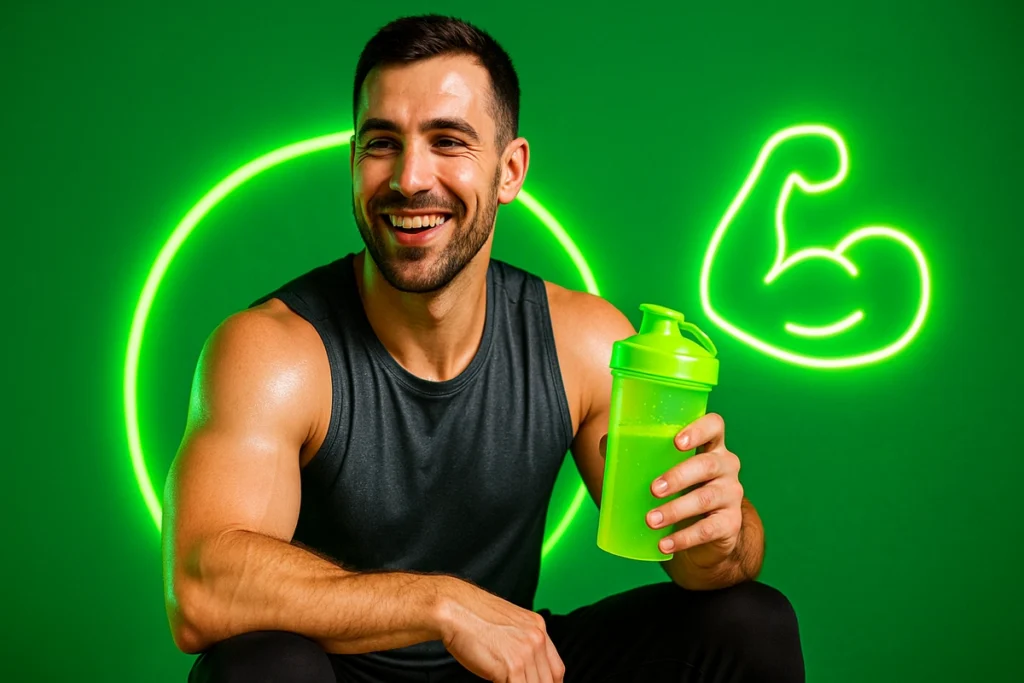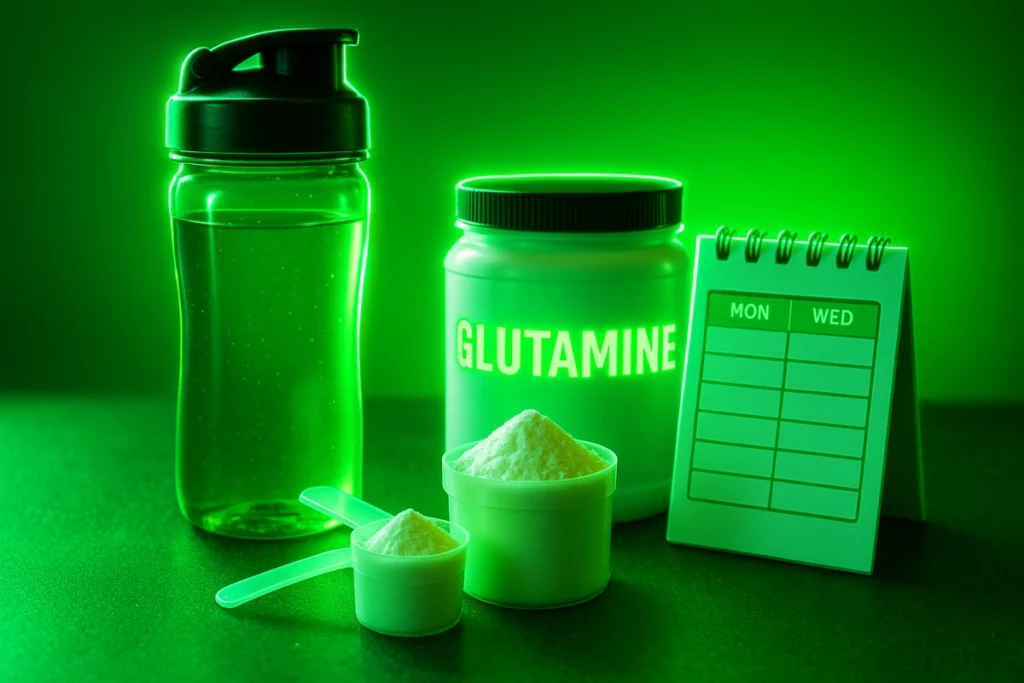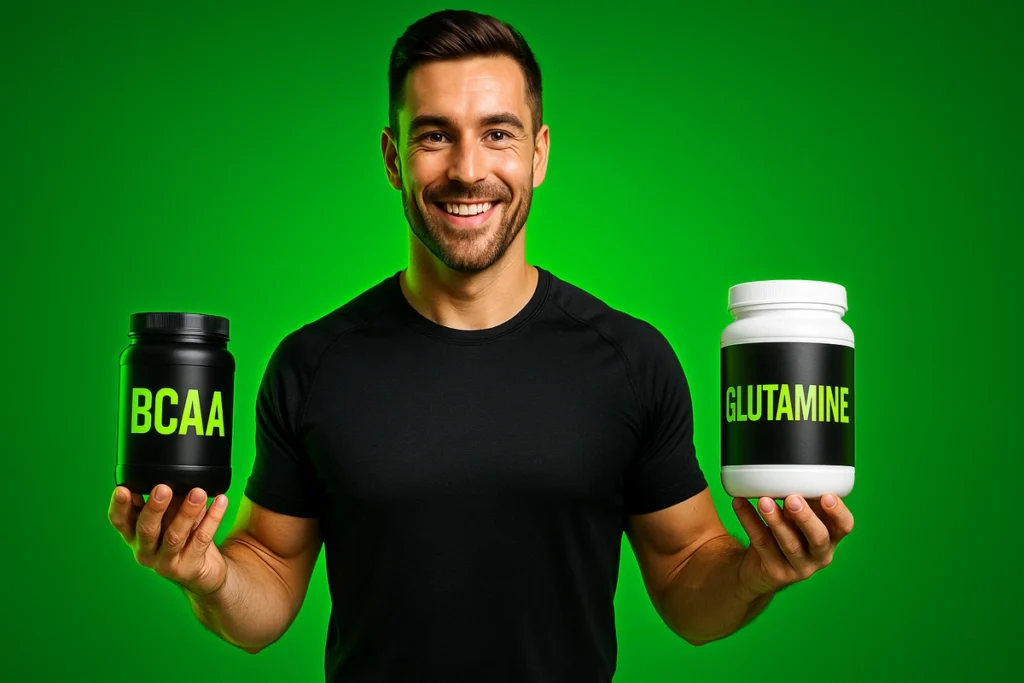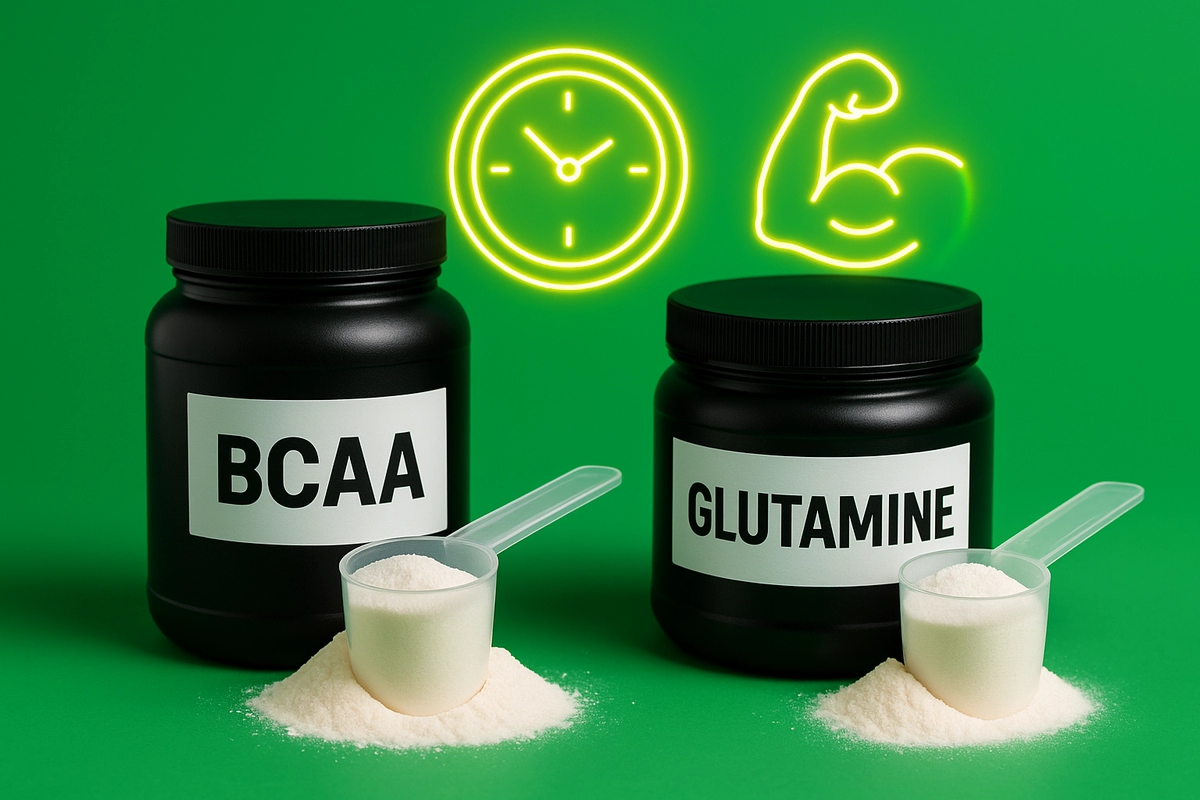With years of experience as a professional fitness trainer—both in my own training and coaching clients—I’ve noticed that many athletes are unsure about the right timing and method for taking BCAA and Glutamine to maximize their benefits.
The answer depends on your specific situation. If you’re in a cutting phase with a caloric deficit, there’s a high chance that your body will lose muscle along with fat. This is where BCAA helps protect muscle tissue from breakdown.
On the other hand, when you’re training hard and heavy, especially while dieting, muscle recovery becomes much more challenging. This is where Glutamine plays a critical role in reducing soreness and speeding up muscle repair after tough workouts.
I’ve personally tested these supplements and recommended them to my clients, so I’ve seen their effects firsthand. However, they’re not necessary for everyone. Let’s break down exactly when and how to take them for the best results.
Table of contents
- Best Timing and Dosage for BCAA and Glutamine
- Why Take BCAA? (Real-World Benefits)
- Why Take Glutamine? (Real-World Benefits)
- How to Take BCAA and Glutamine for Maximum Effectiveness
- Are There Any Side Effects?
- Do You Really Need These Supplements? (Honest Answer)
- Real-World Examples: How BCAA and Glutamine Made a Difference
- Final Thoughts: Should You Take BCAA and Glutamine?
Best Timing and Dosage for BCAA and Glutamine

When to Take BCAA
- After waking up – Helps prevent muscle breakdown after an overnight fast.
- Before workouts – Ensures your muscles have readily available amino acids and prevents muscle breakdown.
- During workouts – Helps maintain energy and prevents the body from using muscle tissue as fuel.
- After workouts (optional) – Not necessary if your post-workout meal contains high-quality protein.
- Before bed – Provides amino acids during sleep to support muscle recovery and prevent overnight muscle loss.
Pre- and intra-workout BCAA intake is more effective than post-workout, as whole protein sources (whey, chicken, fish) provide more complete recovery support post-workout.
I prefer taking BCAA before my workout, so my body has absorbed it by the time I start training. During longer or more intense sessions, I also sip on BCAA during my workout to prevent muscle loss.
A 2012 study on BCAA supplementation and muscle recovery found that taking BCAA before and after intense resistance training can reduce muscle damage and speed up recovery.
When to Take Glutamine
- Post-workout – Aids muscle recovery and reduces soreness.
- Before bed – Helps muscles repair overnight and prevents overnight muscle breakdown.
While glutamine before bed won’t hurt, its main scientifically proven benefits are immune function and gut health rather than direct muscle growth or overnight muscle preservation.
A study suggested that glutamine can help muscle recovery in endurance athletes, but less evidence supports its benefits for strength athletes. (Trusted Source 3: mcgill.ca)
Glutamine is a must for me after a tough workout, especially leg day. It makes a huge difference in how sore I feel the next day.
Recommended Dosages
- BCAA: 5–10 grams per serving.
- Glutamine: 5–10 grams per serving.
Can You Take BCAA and Glutamine Together?
Yes! They work great as a combination. Taking both before bed is a solid strategy, as Glutamine enhances overnight recovery while BCAA prevents muscle breakdown when you’re fasting during sleep.
I’ve tried taking BCAA and Glutamine together before bed, and it worked really well. I woke up feeling fresher, with less muscle soreness, and my recovery improved.
Studies show that combining multiple amino acids enhances muscle protein synthesis, but whole protein sources remain superior for muscle growth and recovery. See research on amino acid synergy and a comparison of amino acids vs. whole proteins.
Why Take BCAA? (Real-World Benefits)

From my experience, BCAA works best when you’re in a calorie deficit and trying to maintain muscle. When I was cutting without BCAA, I noticed a gradual loss of muscle mass despite keeping my protein intake high.
However, after increasing my BCAA intake to twice daily, I saw a clear difference—muscle retention improved, and I felt less fatigued during workouts.
Main Benefits of BCAA:
- Prevents muscle loss during a calorie deficit. (However, BCAA alone isn’t enough to prevent muscle loss—adequate total protein intake is still the most crucial factor)
- Boosts endurance and reduces workout fatigue.
- Supports muscle recovery.
- Enhances protein synthesis.
When I was cutting and didn’t use BCAA, I could feel my muscles getting smaller. But after adding it back, I noticed I was holding onto my muscle much better, even while dieting.
Why Take Glutamine? (Real-World Benefits)

The biggest game-changer for me was adding Glutamine post-workout and before bed. Without it, my muscle soreness lasted for days, especially after intense leg workouts.
Once I started taking 5 grams post-workout and 5 grams before bed, I noticed:
- Faster recovery.
- Less muscle soreness.
- Better ability to train frequently without burnout.
After a heavy leg day, I used to be sore for days. But when I started taking Glutamine regularly, my recovery improved significantly, and I could train harder without feeling wrecked.
Glutamine might help with soreness, but its main proven benefits are gut health, immune function, and nitrogen balance maintenance.
Research on glutamine supplementation presents mixed results regarding its benefits for muscle recovery and immune function:
- Muscle Recovery: A 2021 study indicated that glutamine supplementation might reduce exercise-induced muscle damage, particularly in activities with eccentric movements. However, individual responses varied, suggesting that its effectiveness may depend on specific exercise types and personal factors. (Trusted Source 1: PubMed Central)
- Immune Function: Glutamine serves as a crucial nutrient for immune cells, supporting functions like lymphocyte proliferation and cytokine production. This underscores its significant role in maintaining immune health. (Trusted Source 2: PubMed Central)
In summary, while glutamine supplementation shows promise in supporting both muscle recovery and immune function, its effects can vary among individuals. Further research is necessary to fully understand its benefits and optimal usage.
How to Take BCAA and Glutamine for Maximum Effectiveness

BCAA Usage
- Mix with water or an intra-workout drink.
- Best taken before and during workouts to protect muscle tissue.
Glutamine Usage
- Mix with water or a protein shake post-workout.
- Take before bed if your training sessions are especially intense.
If my workout is very intense, I take Glutamine both after training and before bed. It really helps my muscles recover while I sleep.
Best Strategy for Maximum Results
- Take BCAA intra-workout to prevent muscle breakdown.
- Take Glutamine post-workout and before bed to speed up recovery.
Are There Any Side Effects?

The FDA classifies both supplements as safe when taken in recommended amounts.
BCAA and Glutamine are generally safe, but excessive intake may cause minor side effects.
BCAA Side Effects
- Digestive discomfort
- Nausea
- Headaches
Glutamine Side Effects
- Stomach bloating
- Mild gastrointestinal discomfort
How to Avoid Side Effects
- Stick to 5–10 grams per serving.
- Drink plenty of water to aid absorption.
- If you feel discomfort, reduce the dose and gradually increase it again.
I’ve personally never had side effects from BCAA or Glutamine, and none of my clients have either. These are some of the safest supplements you can take.
Do You Really Need These Supplements? (Honest Answer)

Not everyone needs BCAA and Glutamine. Here’s my advice:
- If your diet is already high in protein and your training isn’t extremely intense, you probably don’t need them.
- If you’re in a caloric deficit and struggling to preserve muscle, BCAA can help.
- If you train hard and often and experience significant soreness, Glutamine is worth trying.
Whole food sources and complete protein powders are superior to isolated amino acid supplementation.
A study by Australian Institute of Sport found that BCAA supplementation has limited additional benefits when total protein intake is adequate. (Trusted Source)
I only recommend these supplements to my clients who train intensely or are cutting calories. If you’re eating enough protein and not training at high intensity, you probably don’t need them.
Real-World Examples: How BCAA and Glutamine Made a Difference

My Personal Experience
During a strict cutting phase, I noticed muscle loss despite eating enough protein. Adding BCAA before and during my workouts made a huge difference—my energy improved, and my muscles stayed full and strong even on low calories.
Client Example
One of my clients trained six days a week and experienced severe muscle soreness that affected his consistency. After adding 5g of Glutamine post-workout and before bed, his recovery improved significantly, and he was able to train harder without burnout.
Final Thoughts: Should You Take BCAA and Glutamine?

- For muscle protection and endurance: Take BCAA before and during workouts.
- For faster recovery and less soreness: Take Glutamine post-workout and before bed.
- Stacking them together gives the best results for intense training and cutting phases.
- Glutamine’s role in soreness reduction is not strongly proven—its biggest benefit is for immune health and gut support.
- BCAA post-workout is unnecessary if total protein intake is sufficient—pre- and intra-workout are better times.
- Whole protein sources (whey, chicken, fish) are superior to BCAA and Glutamine supplements.
If you train hard and consistently, these supplements can help you push further and recover better. But always prioritize a proper diet first.
Supplements should support your training—not replace a good diet. Use them wisely, and they’ll make a difference.
With years of coaching experience, I’ve helped athletes optimize BCAA & glutamine for muscle growth and recovery. This guide combines real-world expertise with trusted research for the best results!
💬 Share Your Thoughts: Tried BCAA & Glutamine? How did it work for you? Comment below and let’s chat!
Recommended Resources on BCAA & Glutamine
For further reading on the science behind BCAA and glutamine supplementation, check out these authoritative sources:
- Effects of BCAA on Muscle Damage and Soreness
A scientific review on how BCAA supplementation impacts post-exercise muscle damage and recovery. - Best Time to Take BCAA for Maximum Benefits
A detailed guide from Healthline covering the optimal timing for BCAA intake. - L-Glutamine Benefits for Muscle Recovery
Everything you need to know about L-Glutamine’s role in workout recovery and immune health.
🩺 Disclaimer: This article is for informational purposes only and not medical advice. Always consult with a healthcare provider before starting any supplement.



Leave a Reply